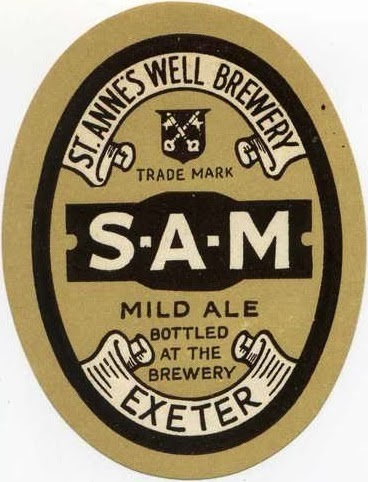I'm currently hard at work getting a couple of weeks ahead in my posts. When I go to the US next month, I'll have enough posts lined up that I won't need to write while I'm away. The way the schedule is packed, I'll have no time. I've just seen another of my rest days disappear
I'm developing an unhealthy interest in the St. Anne's Well Brewery. All because they dabbled in Lager in the 19th century.
I'm starting to see a pattern in chairmen's speeches at annual meetings. They often took the opportunity to make what are more political than commercial points. This was especially true of the years immediately after WW I, when it wasn't clear at what level taxation and opening hours would be fixed.
At the time, it was by no means certain that the type of retricted opening times enforced during the war would become permanent. On the other hand temperance twats were pushing for the "local option" - having local polls on whether or not to go dry. It was a difficult time for brewers and decisions which had a huge impact on there finances were completely out of their hands.
"St. Anne's Well Brewery Co., Ltd.
The annual meeting was held at Exeter, Mr. W. C. Richards presiding.
The directors recommended payment of a dividend of 10 per cent. on the ordinary shares. The trading profit for the year was £11,540, making, with £6,715, the balance from last year's account, £18,255.
The chairman, in moving the adoption of the report, said the year had been quite satisfactory. Times pressed rather hardly on the Trade, but, as he had intimated, the company had not done at all badly during the year. The shortening of licensed hours, particularly in country districts, had been a great blow to licensed victuallers, who were the principal customers of the company, he hoped that in the future, no matter what Government was in power, the hardships to the Trade would be considered. In the country districts people got up quite early, and, although people in towns did not require a drink until certain times. there were people who desired to have refreshment much earlier in the country by reason of their commencing work the first thing in the morning. And, that being so, he failed to see why they should not have it. He hoped those responsible would not listen entirely to the voices of the enemies of the Trade, but show them consideration, which would be much appreciated.
Mr. L. D. Thomas seconded the motion, which was carried."
"The Brewers' journal, 1923", page 18.
I'm sure lots of agricultural workers did get up at daylight. But the same was true of many workers in towns, too. I don't see that as a totally rural problem. Whilesale markets, for example, often had pubs with exemptions from the normal hours and would open early in the morning.
Sadly, I've no details of any St. Anne's Well beers. But I do have some from one of there Exeter rivals, Norman & Pring of the City Brewery.
| Norman & Pring beers 1928 - 1961 | |||||||||||
| Date | Beer | Style | Price | size | package | Acidity | FG | OG | colour | ABV | App. Atten-uation |
| 1928 | City Special | Pale Ale | 6d | pint | bottled | 0.05 | 1008.7 | 1036.1 | 3.55 | 75.90% | |
| 1949 | Mild Ale | Mild | 1/1d | pint | draught | 0.06 | 1006.8 | 1032.6 | 21 brown | 3.35 | 79.14% |
| 1953 | Imperial Strong Ale | Strong Ale | 1/6d | nip | bottled | 0.05 | 1051.8 | 1081.2 | 16 + 40 | 3.74 | 36.21% |
| 1953 | Light Ale | Light Ale | 6d | nip | bottled | 0.05 | 1011 | 1031 | 17 | 2.58 | 64.52% |
| 1955 | Nap Ale | Strong Ale | 1/- | half | bottled | 0.05 | 1011.8 | 1037.7 | 33 | 3.35 | 68.70% |
| 1955 | Pale Ale | Pale Ale | 11d | half | bottled | 0.05 | 1009 | 1031.1 | 20 | 2.86 | 71.06% |
| 1960 | Pale Ale | Pale Ale | 10d | half | bottled | 0.02 | 1003.8 | 1031 | 15 | 3.40 | 87.74% |
| 1961 | Tan Bitter | Pale Ale | 24d | pint | draught | 0.04 | 1005.2 | 1038.4 | 18 | 4.15 | 86.46% |
| Sources: | |||||||||||
| Whitbread Gravity book held at the London Metropolitan Archives, document number LMA/4453/D/02/001 | |||||||||||
| Whitbread Gravity book held at the London Metropolitan Archives, document number LMA/4453/D/02/002 | |||||||||||
I just checked the FG of that Imperial Strong Ale. I assumed that it was a typing fault. It wasn't. It really says that in the Gravity Book, though I'm inclined to doubt that it's true.












































































1 comment:
Maybe it was meant to age in the bottle, quite a lot?
Post a Comment